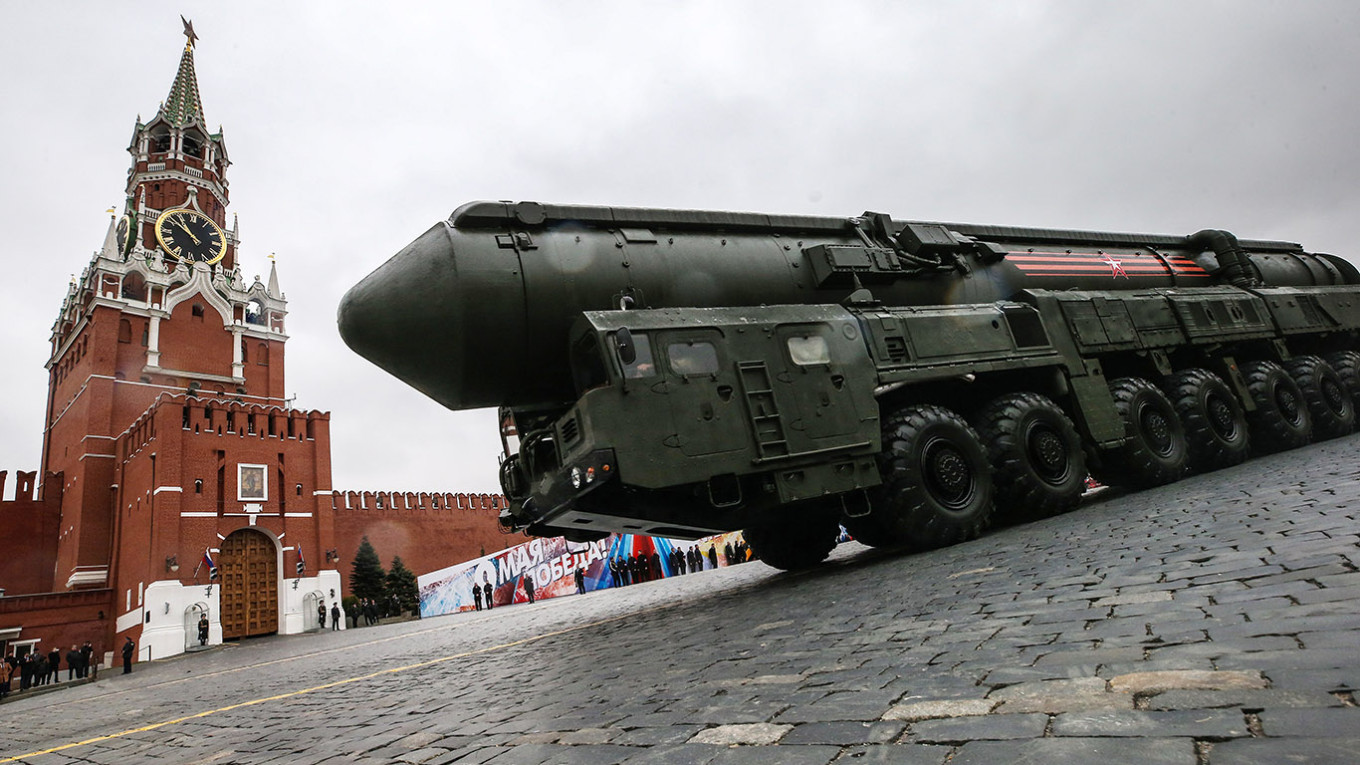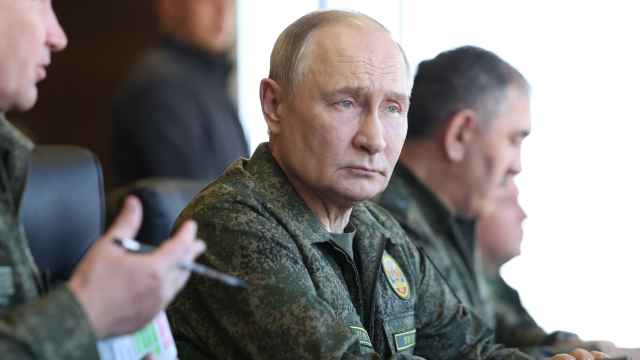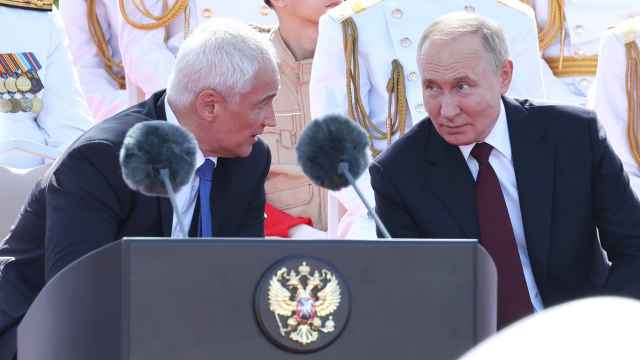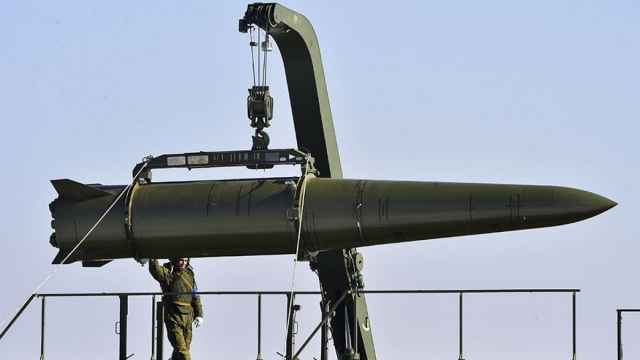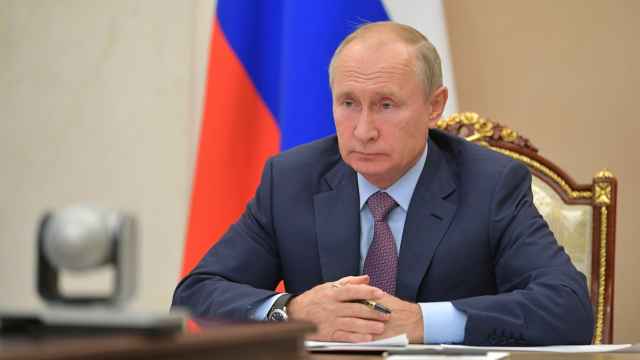President Vladimir Putin on Monday offered to extend Russia’s participation in the New START Treaty, the last surviving arms treaty between the world's two largest nuclear powers.
While experts and analysts hailed Putin’s announcement as a concrete step toward limiting nuclear stockpiles, especially if it leads to further talks, they also noted that Russia is likely hoping to bolster its negotiating position with Washington on Ukraine.
“Pretty much everything that comes out of Putin’s mouth these days is related to Ukraine” and his efforts are geared toward “finding a way to bring the Ukraine war to a successful conclusion,” said John Erath, senior policy director at the Center for Arms Control and Non-Proliferation. “I think it’s a way to signal a willingness to cooperate with the West on something that is important, without seeming to compromise on Ukraine.”
Pavel Podvig, director of the Russian Nuclear Forces Project, described Putin’s offer as more of “a general mood-setting initiative” than a proposal with specific ulterior aims.
Set to expire in February 2026, the New START Treaty was largely thought to be abandoned after Russia withdrew from it in 2023.
But in a televised meeting of his Security Council, Putin announced that he was prepared to continue adhering to the treaty for an additional year.
“Subsequently, based on an analysis of the situation, we will make a decision on whether to maintain these voluntary, self-imposed restrictions,” Putin continued.
He did not give any indication that he wanted to discuss an agreement to replace New START. Putin has, on numerous occasions over the past three years, made passing threats of attacking Western countries with nuclear weapons, usually framing such an action as a potential defensive measure.
Kremlin spokesman Dmitry Peskov later clarified that Putin had not discussed the move with Trump in advance.
“We are indeed on the threshold of a situation where we could be left without any bilateral documents regulating strategic stability and security, which, of course, is fraught with great dangers in terms of the overall global situation,” Peskov said.
Non-proliferation experts welcomed the announcement.
If this gesture becomes the jumping off point for talks on a long-lasting arms control treaty, Putin and Trump “can help reduce the most immediate existential security threat facing the world,” Daryl Kimball, executive director of the Arms Control Association, said in a statement.
“We strongly encourage President Trump to reciprocate Putin’s proposal,” Kimball continued.
White House Press Secretary Karoline Leavitt said Monday that the proposal sounded “pretty good” but declined to elaborate on Trump’s position.
What is the New START Treaty?
Signed by Presidents Dmitry Medvedev and Barack Obama in Prague in 2010, New START is a wide-ranging arms reduction agreement hailed as a substantial step toward reducing nuclear stockpiles and the threat of nuclear war.
It supplanted the 2002 Strategic Offensive Reductions Treaty (SORT), which expanded upon the first and second START treaties signed in the 1990s.
After the U.S. withdrawal from the Intermediate-Range Nuclear Forces Treaty during Trump’s first term in 2019, New START became the only remaining agreement limiting U.S. and Russian nuclear weapon deployments.
The U.S. and Russia hold the vast majority of the world’s nuclear weapons stockpiles, and there was a widespread desire to limit each country’s ability to continue growing them after the fall of the Soviet Union.
New START’s provisions cap deployed nuclear warheads at 1,550 and nuclear weapon delivery systems — such as ballistic missiles and nuclear-weapon-fitted bombers — at 800. While not limiting stocks of non-deployed intercontinental and submarine-launched ballistic missiles, the treaty does allow for each side to monitor stockpiles.
In 2023, Putin suspended Russia’s participation in the treaty but did not withdraw, a nuanced difference that has allowed the Kremlin to keep arms control a hot-button issue in negotiations with the West. Putin said the reason for his decision to suspend New START was due to the West’s military support to Ukraine, including helping Ukraine strike Russian bases where nuclear bombers are stationed.
Trump’s next move
While it is not yet clear how Trump will respond, his prior statements suggest he takes a friendly view of arms reduction efforts and would likely accept Putin’s offer. In July, Trump said he would like to maintain New START’s nuclear stockpile limits.
“That's not an agreement you want expiring,” Trump said, later adding, “when you take off nuclear restrictions, that’s a big problem.”
Part of Trump’s motivation lies in his self-image as a peacemaker, said Podvig. He suggested that extending New START does not have any real downside for either Trump or Putin, and can only boost each leader’s image.
“This is something that was sort of expected, [it is] the low hanging fruit,” Podvig said. “It doesn’t really cost much to Russia — actually it’s maybe more difficult on the U.S. side. It’s not like there are programs in Russia that are itching to start building up [nuclear stockpiles].”
U.S. reciprocation would be a positive development, he continued, “but it won’t change anything dramatically because these are just political pledges, and there is no kind of verification mechanism attached.”
At the same time, talk of long-term nuclear arms control with Russia could put the White House in an awkward position. China hawks in Washington, alarmed by Beijing’s gradually expanding nuclear arsenal, believe that the U.S. may eventually need to deploy more nuclear weapons. In the absence of long-term arms control treaties, all three countries could continue to build their stockpiles.
Extending New START is therefore a stopgap solution, said Erath, the Center for Arms Control and Non-Proliferation expert.
“The U.S. should be announcing that it is extending its compliance with the New START limits anyway,” he said, suggesting it should have “nothing to do with any statement coming out of Russia.”
A Message from The Moscow Times:
Dear readers,
We are facing unprecedented challenges. Russia's Prosecutor General's Office has designated The Moscow Times as an "undesirable" organization, criminalizing our work and putting our staff at risk of prosecution. This follows our earlier unjust labeling as a "foreign agent."
These actions are direct attempts to silence independent journalism in Russia. The authorities claim our work "discredits the decisions of the Russian leadership." We see things differently: we strive to provide accurate, unbiased reporting on Russia.
We, the journalists of The Moscow Times, refuse to be silenced. But to continue our work, we need your help.
Your support, no matter how small, makes a world of difference. If you can, please support us monthly starting from just $2. It's quick to set up, and every contribution makes a significant impact.
By supporting The Moscow Times, you're defending open, independent journalism in the face of repression. Thank you for standing with us.
Remind me later.



